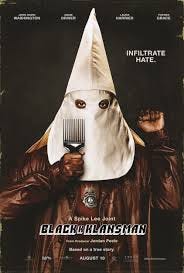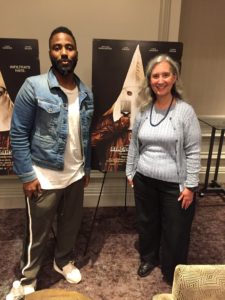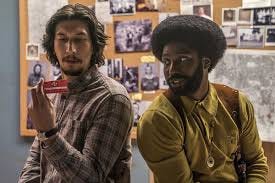Interview: John David Washington of “BlackkKlansman”
Posted on August 6, 2018 at 8:00 am
Former pro football player and “Ballers” co-star John David Washington stars in Spike Lee’s new film, “BlackkKlansman.” It is based on the true story of Ron Stallworth, the first black law enforcement office in Colorado Springs, who infiltrated the Klu Klux Klan over the telephone in the 1970’s. In an interview, Washington talked about playing someone who is pretending to be what he is not, rocking a 70’s look, and his dream role in a Shakespeare classic.

Was Stallworth really so inexperienced that he accidentally gave the KKK his real name?
Exactly. He was just trying to make a name, he was ambitious and he was in the moment very emotional and he had a brain freeze. I asked him several times what really happened, and after like the third week of asking he said the same thing, and I was like, all right, that must be the real story.
Your character is basically lying to everybody, not just to the Klan but also to the girl he likes, who would not spend time with him if she knew he was a cop.
He was a man that believed in what he was doing. He was this sort of Jackie Robinson police detective. I can’t imagine what that feels like, being in that community being the only person that looks like you. So I think he had to build up this sort of defense or shield he had to protect himself so maybe getting into these characters helped him be able to do his job more fluidly. If he exposed too many emotions or trusted too much that could compromise how he does his job and the integrity of it, What happened with the love interest, though, that’s when he started to break that wall down and because of not just her and her passion and her beauty but the cause.
It’s not like he wasn’t aware of his people. He says, “Because I’m not going to give it away it doesn’t mean I’m not for the liberation of my people.” He believes that he can do on the law side and I appreciate that. He thinks, “We’re trying to do the best we can. We’re protecting ourselves and the community and that means we got to do what we got to do but we’re doing it the right way or for the right reasons.” It means a lot to have a platform like this to show such emotions and show that we care too.
What was it about or his outlook or his background that made him think that he could change things from the inside?
I can’t give too much away about his background and what motivated him because there is some deep stuff there, but there were some personal experiences that he had gone through to help motivate and sustain him and give him the stamina to take it on the chin and get to where he was. I can’t imagine being a black man in Colorado Springs in the 70’s. He had to persevere.
In “Ballers” you play a guy who pretty much says whatever is on his mind and in this movie you play a guy who keeps a lot inside so tell me how you approach that as an actor.
One’s therapeutic for sure. Ricky Jarret on the football show is more of a representation than the actual person. Ron is living and he’s alive and well and there is a lot of information in his book and I spent time talking to him so it was a different type of concentration, a different type of representation. It’s not just an idea. It’s just about this man who lived and how he lived and what he believed in.
Also I feel like who’s directing and who’s guiding the ship makes a huge difference for me too. The direction I got from Spike Lee and the trust I got from Spike Lee made this the most unique experience I’ve ever had.

How did Spike Lee first talk to you about the role?
Got a text from him: “this is Spike – call me.” I called him and he said there was a book about a man who infiltrated the Klu Klux Klan. He sent the book, and I was like, “All right.” I read the book and was blown away. I called him back like, “I can’t believe this! This is incredible.” From then on it wasn’t like “So, you want to do it?” It wasn’t like, “Let’s discuss feelings,” or anything like that. He was like, “I’ll have the script for you in a couple months,” so I started doing research as if I was getting ready for the role.
What did it feel like to see yourself in that 70’s hair and wardrobe?
I loved it! I didn’t want to look like we’re playing Halloween 70’s like in films that almost are like making fun of how they dressed. I remember Spike was talking about this passionately like, “We thought we were fly. We thought we looked great,” so that authenticity really helped inform us as what choices to make based off of how we felt with the clothes we put on with the fabric and the accessories and obviously the hair and the shoes. It was great.
So when you first looked at yourself in the mirror tricked out like that what did you think?
I thought, “There he is,” and then, “Just go get it.
At one point you’re talking to the head of the KKK, David Duke, played by Topher Grace, over the phone, and he brags about being able to tell by voice who is black. How did you think about your voice in those calls?
He can speak jive or the King’s English. I have a wealth of experiences too from private school to HBCU, historically black college, to North Carolina where I spent a lot of time. All that is a part of me, how I talk and how I speak and even in my cadence; it can change when I get excited about certain things and so sometimes I have this North Carolinian cadence.
I love that he didn’t put on, he didn’t see it like putting on a white voice and I don’t know what that means either to be honest personally, but what he did do was use a certain language. There was a certain hate vernacular that helped entice hatred to him so that he can penetrate that hatred. He called them trigger words, and David Duke was so sure a black man would not use those words he never suspected.
The KKK members use those hateful terms and describe horrible acts in such a casual tone of voice, too.

It’s one thing when you’re emotional about something and you express it through a curse word or raise your voice, but like you said, this is regular conversation.
Ron’s partner, played by Adam Driver, had to pretend to be him when they met in person. How did you work with Adam on coordinating that?
Ron in the book talks about how they worked together. They would meet and make sure they were on the same page with the information that he got and what he said and once Adam’s character got it they had to make sure they coordinated to make sure they were on the same page, so we were doing the same things. We weren’t necessarily trying to sound like each other because Ron said they really did which is a huge take away for me, too. One time it was a close call but like they just didn’t pick up on him; they never did.
The movie makes it clear that the fellowship was really a large part of the appeal of the Klan. They just wanted to feel like they were a part of something.
Absolutely, it was institutional hate; it was organized. There is a camaraderie. That brotherhood I think was a part of a draw and strength in numbers. Again that’s why these trigger words, the language that’s used in this film are vulgar and a bit abrasive but it had to be; it was necessary because this is the language that is spoken and this is how he was able to get in and maintain this case and get it to where he got it to.
It took a lot of courage to do that.
I agree. One of the hardest days on the film for me, it seemed like one of t=the most authentic days, when I was really in a time warp was the banquet scene, when Ron is on security detail. I called Ron Stallworth afterward and told him, “You’re a true hero. I can’t believe you did that.” I felt like personally John in that role on that day was looking death right in the eyes several times.
Watching the scene it was giving me anxiety. I know what’s going to happen and I’m still like, “Oh my,” it was tripping me out. That day was a hard day for all the actors, we all talked about it.
I heard that your dream role is Petruchio in Taming of the Shrew by Shakespeare.
I’m trying to! If you know anybody tell them I said we’re looking for funding and by God, I’ll do it. I keep the monologue on me at all times. The way when I was working on it I found him a bit of a misunderstood character. Traditionally it is played a certain way but I felt like he was more sensitive than given credit for. I felt the sensitivity that was insecurity like some mother issues coming out which I would have loved to explore through this guy. So I had this other kind of approach. That’s just me and the language.
Ashlie Anderson, whose character I have to I run after and chase, before every take we would do the scene. We would get our Taming of the Shrew on before they started to film, Ashlie, shout out to you girl; we’re partners in that.
What do you think of when you think of the KKK?
My mom had an encounter with the KKK when she was I think 7 years old in North Carolina. She snuck into a cross burning. I’m so lucky she didn’t get caught because I wouldn’t be here.
